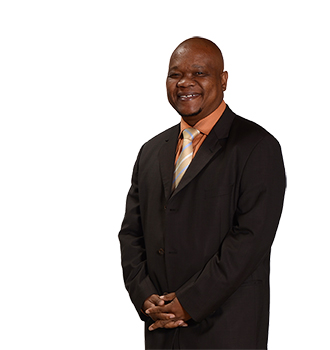Latest News Archive
Please select Category, Year, and then Month to display items
13 January 2020
|
Story Eugene Seegers
|
Photo Anja Aucamp
 Spearheading the digital expansion of the conversational Sesotho course is IDEAS Lab Director, Johann Möller (middle). With him are from the left: Prof Pule Phindane, CUT; Dr Brenton Fredericks, CUT; Bahedile Letlala, UFS Department of African Languages; and Dr Elias Malete, UFS Department of African Languages.
Spearheading the digital expansion of the conversational Sesotho course is IDEAS Lab Director, Johann Möller (middle). With him are from the left: Prof Pule Phindane, CUT; Dr Brenton Fredericks, CUT; Bahedile Letlala, UFS Department of African Languages; and Dr Elias Malete, UFS Department of African Languages.
For many years now, the UFS has been offering a one-year course in conversational Sesotho for staff members; this can then be followed up with the one-year course in advanced conversational Sesotho. The conversational Sesotho for students in the Faculty of Education was introduced in 2018 at the UFS.
The Central University of Technology (CUT) needed a conversational course for its first-year students and approached the Department of African Languages for the development of such a course. Living as we do in a multilingual country; this additional language skill opens doors and often hearts as well.
Using instructional design principles
However, the need was identified by both CUT and UFS to present this crucial information in a way that would be more appealing to digital natives as well as to those less familiar with technology. The Department of African Languages on the UFS Bloemfontein Campus, together with relevant departments from the CUT, approached the IDEAS Lab located on the UFS South Campus, since they already have a reputation for being a specialist on broadcasting and repackaging curricular content for digital presentations. The IDEAS Lab provided technical advice and built the multimedia programme, which will help the user to hear and practice phrases in Sesotho, using instructional design principles. The course will be available to both staff and students belonging to the two universities.
Room for growth
Johann Möller, Director of the IDEAS Lab, says this pilot programme will give both institutions the opportunity to test the use of multimedia for language acquisition. He adds, “Language is extremely complex, and we would like to expand this learning aid in the future.” In fact, the original design has room for growth built into it.
To keep things simple for the user and the building team, it was decided to start out with only four potential everyday scenarios where a staff member would like to speak Sesotho: Firstly, how to greet other persons from different genders; secondly, potential scenarios one might encounter in the university environment itself; thirdly, how to deal with situations at a hospital; and finally, how to use one’s language skills at a filling station.
Pronunciation is key
Each scenario contains three to four conversations that the learner can revise, along with images and audio that illustrate the situation and assist with correct pronunciation. The system does not allow the user to progress unless they have listened to the pronunciations of the sample sentences or phrases.
Further reading material and vocabulary lists are also provided, with the result that people who are using the programme can learn at their own pace. The authoring software Articulate Storyline was used to build the individual scenarios and each conversation or lesson within it. The lessons are also not dependent on an internet connection; they can be downloaded onto a flash memory drive and used offline.
Meet our Council: MEC Tate Makgoe – A proud vision for all
2016-06-07

MEC Tate Makgoe
Photo: Stephen Collett
The MEC of Education in the Free State, Mr Pule Herbert Isak Makgoe, is serving his third term on the UFS Council.
MEC Tate Makgoe, as he is known, holds a Chemical Engineering degree from the Technikon Vaal Triangle, a Bachelor of Commerce degree from Unisa, an Honours in Commerce degree from the UFS, and a Master’s degree in Business Leadership from Unisa.
Early years
From an early age, he was acutely aware of the delicate and volatile political landscape in the country caused by draconian apartheid policies. He has been active in the political realm since 1984, when he left the country to join the ANC’s military wing, Umkhonto we Sizwe, in exile.
“I have devoted my life to the disadvantaged and marginalised in order to realise fully the objectives of true political transformation, and the total eradication of grinding poverty,” he says. His political activism landed him in Sun City prison from 1986 to 1991.
After the unbanning of the ANC, MEC Makgoe became a Northern Free State regional executive member and, in 1994, he was appointed as the ANC’s election campaign manager in the Free State. He has also served as provincial treasurer, and as a member of the executive committee of the ANC in the province.
MEC Makgoe’s current position
After serving as MEC in five portfolios in the Free State Province at different times - Finance, Tourism and Environmental Affairs, Agriculture, Public Safety and Security, and Finance – MEC Makgoe was appointed as MEC for Education in 2009, a position he has held ever since.
In 2014, he received the prestigious Ubuntu Award for Education by the Turquoise Harmony Institute for his outstanding leadership role in steering the department to produce the highest matric pass rate in the country of 87,4%. Previous recipients of the Ubuntu Award include late former president, Nelson Mandela, and anti-apartheid struggle icon, Ahmed Kathrada.
Recipient of Kovsie Alumni Cum Laude Award
MEC Makgoe is also a former recipient of the Kovsie Alumni Cum Laude Award. The Cum Laude Award is bestowed occasionally on an alumnus for outstanding service or achievement on regional, national, or international level in his/her field of work. He is married to Ivy, and the couple have three children: Palesa, Maki, and Junior.